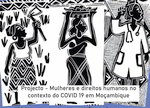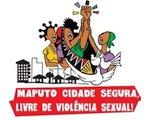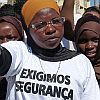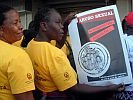Family Law: Background
and Context of its Approval
Maria José Arthur, Teresa Cruz e Silva,
Yolanda Sitoe and Edson Mussa
Approval of the Family Law in 2004 (Law 10/2004) was the culmination of a major fight for equality and non-discrimination within the family. Revealed as not just a place of affection and solidarity, but also of confrontation, hierarchies and exclusion, for some people the family is an inviolable stronghold that should remain outside state policies. For others, including human rights activists of both sexes, it requires urgent intervention so that citizenship rights can be enjoyed within the family space by those who are normally deprived of them, women and children.
The first attempts to change the family law date back to 1975, immediately after independence, when laws had to be adapted to new imperatives, the principles established in the Constitution and the political and ideological orientation of the day. However, the process that would eventually culminate in a new Family Law in 2004 only began in 1998. They were six years of intense debate that revealed the enormous potential of resistance to change, resistance not only by extremely conservative sectors but also by institutions with governance and legislative functions. At stake was ending discrimination and ensuring that women and men have equal rights within the family, which would cease to be a privileged space outside the law and the rules governing group relations among citizens, where all kinds of inequities were possible. The Family Law (Law 10/2004) came into force in 2005.
This article is the first of a series based on the results of research by WLSA Mozambique to assess the first five years of the law and its application by the formal and informal instances involved in resolving conflicts in the family law field[1]. We have also tried to identify the law’s shortcomings, ownership of the law by the agents whose duty it is to enforce compliance and by those in communities who mediate family-related disputes, how it is being applied and obstacles that arise not only from the way institutions work but also interference by cultural and patriarchal model.
In this first article we will cover the background and context of approval of the Family Law.
Family Law in some countries in the world and the region, and background to the Family Law in Mozambique
From the mid-20th century onwards, coinciding with the end of the Second World War, there was a proliferation of studies on the family in an attempt to find explanations for the configuration of hierarchies based on sex and age. It ceased to be a peripheral study object, marginal to the major topics favoured by academia to obtain different explanations for the social order. Studies ranged from interpretations of the family as an institution that mirrors the way rules (such as the division of labour) and the forms that give it cohesion are organised, circulated and distributed (among its components) to the conflicts and tensions between public discourse on equality and rights and private discriminatory practices.
We are referring specifically to two aspects. The first concerns the achievement of a universal and inclusive human rights philosophy that, acting on the nature of the State, the democratic structure, guarantees citizens’ equality before the law regardless of sex, age or belief (religious or political). The second aspect is the ambiguous and conflictual relationship between formal equality as institutionalised in public spaces and in countries’ constitutions, the existence of cultural models based on gender exclusion and the persistence of social and legal provisions and arrangements that support discrimination.
We are speaking in particular about the absence of legislation criminalising forms of abusive and forced unions between children and adults (in Mozambique known as “premature marriage”) or the existence, as in many countries in the region, of marriage through inheritance and arrangements whereby a widow is offered to one of her dead husband’s brothers.
As the family is the first place where politics are produced, as it builds values and constrains behaviour through a power structure characterised, among other aspects, by gender inequality it is also a space with specific characteristics derived from its being a place of affections. The research thus included analyses of the different family law provisions in a number of countries (eight states, five in the SADC and four in the PALOP[2]) that are summarised here[3]. Given the research model, the following analytical categories were selected:
- Forms of marriage
- Legal age for marriage
- Administration of property
- Separation of people and property
- Affiliation
- De facto union
In addition to the complexity inherent to a comparison of different types of legislation on the family, the comparative study revealed how conflicts are managed and/or agreements are established between cultural models and the law.
The first important aspect is that in countries such as Malawi, Zimbabwe and South Africa, where there is legal pluralism and both positive law and customary law are recognised, reconciling the two systems means making concessions that lead to ambiguity. Despite attempts to establish “an ideal” marital model through norms governing a civil union, the rules governing traditional marriage enable them to be neither effective nor respected. In theory, gender equality and respect for women’s rights are guaranteed by law; the law determines the legal age for marriage, management of the couple’s property, parental authority, divorce, sharing property and inheritance. In practice, and given that most unions are either informal (de facto unions) or customary (traditional marriage), most women continue to be denied the rights guaranteed by the Constitutions of their respective countries.
Another very important issue related to the limited extent and importance of civil marriage, is recognition of de facto unions. In the laws analysed we found situations ranging from recognition of a de facto union (also called a marital union, a union through permanent cohabitation, a civil union) as having all the effects of a civil marriage (Angola, South Africa, Cabo Verde, Portugal) to limited recognition (as in Brazil, with partial community property) or virtually no recognition. This last situation occurs in Malawi where the absence of a clear definition of the time frame required for recognition in practice prevents people from taking advantage of this provision to claim their rights. The same occurs in Zimbabwe where cohabitation is not a recognised form of union.
Full recognition of de facto unions is essential for guaranteeing women’s rights, especially in countries where civil marriage is not very common or is in decline. Recognition with limited effects is insufficient to safeguard the multiplicity of problems arising from cohabitation, especially when it breaks down.
The situation in Morocco is particularly interesting. Its Family Code, the Moudawana, introduced in 2004, tries to guarantee a woman’s rights in a society where the main form of marriage is Islamic. It raised the legal age for marriage to 18 years and a polygamous marriage requires strict equality between wives and the consent of the first wife who can state in writing, prior to her marriage, that she does not agree to her husband taking other wives. It provides a woman with more guarantees when the marriage is dissolved and custody rights over the children. This is a law that arose in a context intent on “modernising” society and taking a big step towards eliminating discrimination between women and men.
In order to understand the changes introduced by the Family Law in Mozambique, we must look at earlier legislation on the family, supported by the 1966 Portuguese Civil Code that was in effect until it was replaced in 2004.
The Civil Code was inherited from the Portuguese colonial period. It was approved in 1966 although some provisions date back to the 1867 code. Conceived in the context of a colonial and strongly traditional society, marked by inequality between men and women and thus between spouses, the Code’s regulations were established in 1967. So we are speaking of a law based on a patriarchal model where the man had responsibilities within the family, in all economic, social, religious and political spheres, while the wife was submitted to the rules imposed by the society of the time.
We shall now describe the most contested aspects of this legislation and the main demands of human rights organisations involved in the approval process for a new law.
Background to approval of the Family Law
The first post-independence proposals on changes to the Family Law were supported by rights guaranteed by the 1975 constitution. This established “the emancipation of women” as one of the State’s tasks and stated that women and men had equal rights and duties and in a variety of fields (Art. 17). This article was complemented by provisions on the fundamental duties and rights of citizens that reaffirmed the principles of equality and non-discrimination, stipulating that they must guide all legislative action (Art. 26 and 29). Also of note was the State’s obligation to protect marriage, the family, motherhood and childhood (Art. 29).
The first draft of the Family Law dates back to 1978 and affirmed the desire to revise this aspect of family legislation and bring it in line with the Constitution, applying “positive traditional principles” and the ongoing modernisation transformations in the country, while not forgetting that the revolutionary project was also part of modernity. Once drafted, the proposal was discussed by the Mass Democratic Organisations such as OMM and OJM, and People’s Justice teams.
The 1978 draft was never approved and in 1982 a new one was prepared that tried to address a number of family legislation problems as a continuation of the 1978 draft. It was not approved but Supreme Appeal Court Directive 1/82 of 27 February stated that Provincial Courts could decide on cases of divorce by mutual consent and recognition of the dissolution of de facto and polygamous marriages. This Directive was in force until 1992, when it was suspended by the Supreme Court on the grounds that the Ministry of Justice, through its Supreme Appeal Court, regulated matters relating to legislative bodies.
Law 8/92 of 6 May was approved in order to address urgent situations, taking up part of the suspended Directive that had been in turn inspired by the 1982 draft Family Law. It covered divorce by mutual consent and established rules for the respective administrative procedures. Recognition and thus legal protection for de facto and polygamous unions were set aside. Until 2004, when Family Law 10/2004 was enacted, people living in de facto unions had no legal protection whatsoever.
Process leading to approval of the current Family Law
The Law Reform Commission was created in 1997. It was responsible for conducting law reform processes and had two sub-commissions: one to revise the Family Law and another to revise the Penal Code.
Although the assumptions underlying reform of the Civil Code section dealing with family relations were primarily the Constitution and universal human rights principles, the Commission wanted to prepare a draft that reflected the characteristics of Mozambican societies. In a text presented to a seminar by two members of the Family Law sub-commission (Sacramento and Pinto, 1997: 121), it was argued that the State must protect the family as the basic cell of society, as did the 1975 Constitution that “refutes the atomistic view of the family” and contemplates “the correct dimension of man as an eminently social being”. Their position was that one should “establish the State’s responsibility to protect the family as an institution with its own life, not as a right granted by the State arising from a union between two beings”.
This argument was developed later (Sacramento, 2000: 110-111) with the presentation of two possible ways to reform the law: firstly, by adapting customary law (“some aspects”) to written law, “raising it to the status of positive law”; secondly, by creating a new Family Code “rooted in the Mozambican socio-legal reality but enhanced by principles of universal law”. The problem with the first alternative was that the two systems had different philosophies. Mozambique has a wide variety of family situations, influenced by local cultures and different religious faiths, although the “pure family organisation model” still predominates. He was thus of the opinion that the second alternative would be the most appropriate, albeit complicated. This led to a compromise, “a future Family Law must have essentially pragmatic characteristics and seek in customary law principles that the North and South have common in order to find an adept way of knowing how to reconcile rules that continue to regulate the family institution in our society with the universal principles established in the constitutional text”.
The author emphasises the following important aspects that must be taken into account when drafting a future law:
- Recognising and giving legal protection to the family, establishing the mutual duties and obligations of its members, incorporating the principles of international legal instruments on child protection;
- Rethinking forms of marriage, “giving due recognition to family models governed by customary law”;
- Regulating the personal and property relations of spouses in line with constitutional norms, safeguarding the need to reconcile them “as far as possible with customary legal rules”;
- Rethinking the divorce model to be adopted; it states that existing legislation is based on the “divorce sanction” and that the 70s and 80s Family Law drafts that were not approved proposed “the divorce remedy”. He thus avoids making a concrete proposal and warns: “it is important to always bear in mind the rules governing this matter in the sphere of family relations based on customary law, otherwise there is the risk of adopting legal norms that will not subsequently be respected by the intended parties”;
- Reviewing everything relating to descent law: no discrimination between children, their rights and obligations to prevent situations of negligence, ill treatment and child abuse;
- As regards parental authority, foreseeing substitution mechanisms such as foster families, and regulating them (Sacramento, 2000: 111-112).
This was the context when, in 1998, the sub-commission for family law reform began discussions intended on the one hand, to sound out people’s feelings and, on the other hand, to legitimise a future proposal. There were meetings and seminars to create space for discussion and for various interest groups to express their opinions, including women’s organisations, religious organisations and other sectors of civil society. Studies were also commissioned on the organisation of the family in the country in order to identify diversity, especially between matrilineal and patrilineal regions[4].
It should also be noted that the conference on women’s rights, held in Beijing in 1995 and Mozambique’s adoption of the consensus document “Beijing Platform”, created a propitious environment for including gender equality principles in the new law. Indeed, 1995 saw the preparation of the “Project and Platform for Mozambican Government Action for Women’s Progress until 2000: strategies and objectives (August 1955). It emphasises the areas of education, health and employment as priorities. These were also contemplated in point III of the “Main Pillars of Government Action”, on improving people’s living standards[5]. Under these plans, the Ministry of Justice was responsible for the family including, among other aspects, reform of the family part of the Civil Code concerning in particular “de facto union, divorce, adoption and custody proceedings as a priority activity.
Nevertheless, during the debates that preceded approval of the new law in 2004, it was very clear that the most controversial issue throughout the process was the main demand of women’s organisations, guarantees that men and women would have the same rights within the family. Questions were raised about the basic justification for law reform. To what extent could the new law disregard culture and usage and customs? How to reconcile cultural rights and religious rights with demands for compliance with constitutional norms?
So cultural and religious arguments were being used, and were widely accepted by the public, to justify preserving certain practices and female and male roles in the family that were considered to be in the private domain, comprising family, sexuality and relations between men and women, among others.
Given this situation, women’s organisations, especially those based in Maputo and organised in the Fórum Mulher network, agreed to intervene more actively to defend women’s human rights. The main demands of women’s organisations were the following:
- The definition of “marriage”: the law should not consider marriage to be a union for reproductive purposes as this has implications for the rights of men and women;
- Autonomy of both spouses in the administration of property;
- Representing the family: elimination of the “head of the family” figure, putting an end to the man being the head in the family relationship;
- Legal age for marriage: the legal age for women and men must be the same. The current legal age difference is based on assumptions that discriminate against women: i) in order to marry a woman merely has to be physically mature; ii) marriage is a union with reproduction purposes; iii) the man must be older in order to be the head of the family and thus guarantee maturity;
- Recognition of de facto unions for: paternity, the exercise of parental authority, inheritance and the right to share property, to see the possibility of expanding the scope of this measure so that it includes recognition of de facto unions for social assistance and tax purposes;
- Recognition of polygamous unions with regard to: protection for children, the right to inheritance and sharing common property;
- Recognition of other forms of marriage, such as religious and traditional, as long as they comply with the law;
- Exclusion of content that legalises rape within the marital relationship (although not yet its criminalisation, which was to included in reform of the Penal Code) (Arthur, 2003)
In response to the scale and intensity of the public debate, especially after the sub-commission started working in 1998 and its position was opposed to equal rights for women and men, between 1999 and 2000 the women’s organisations participating in the process organised workshops and meetings involving both men and women in the South, Centre and North of the country. The items on the agenda were: i) how can the new law help put an end to discrimination and inequality between men and women within the family; ii) gathering opinions on changes to the current law. The aim was to try and respond to accusations of lack of representativity, of defending urban women and not knowing the country’s reality[6].
Following this process the draft was submitted to Parliament in August 2001 but its discussion kept being postponed. It was not debated in Parliament in 2001 or 2002.
It should be noted that when the draft Family Law became widely known from 2001 onwards, after it was delivered to Parliament, there was a new wave of public debate that essentially revisited the subjects that had already been discussed but also covered other articles. The most prominent issues were both specific provisions and also the principles that had guided reform of the law. Firstly, there was insistence on affirming that the Family Law should mirror the country’s realities, as opposed to the idea that the country’s Constitution and the international legal instruments signed by Mozambique must be its fundamental principles. This tension was expressed as a clash of cultures, where “foreign values” were endangering African values: “this draft goes against our culture”, or “against our religion”. However, the vision underlying these claims negated the country’s considerable socio-cultural diversity, and also ignored the major political, social and economic changes in the country since independence.
Secondly, the establishment of the legal age for marriage was hotly debated and indeed had been a controversial issue ever since 1998 when the first version of the draft was presented. The reasons given were based on two major issues: the first was that, biologically, a girl reaches physical maturity earlier than a boy; the second issue reflected the opinion that, when a boy marries, he must have a stable economic situation in order to be able to support his new family. In the middle, other arguments defended the idea that young girls must “be married” in the sense that those responsible for them must organise their marriage as soon as they reach puberty, so that they did not begin an extra-marital wanton sexual life. The rationale behind this argument was: i) a woman’s role in marriage is essentially reproductive and this does not require her informed and responsible consent; ii) a man is the provider and is responsible for the family.
The third aspect in the debate concerned the position of head of the family, with the argument that the male spouse must remain the head of the family by law. The 1996 Civil Code, which was still in force, stated that the male spouse had “Marital Power”: “The husband is the head of the family, and in this quality is responsible for representing it and deciding on all acts of common marital life, without prejudice to the provisions of the following articles”. This provision, that was considered to discriminate against women, was removed from the draft. The term “marital power” was replaced by “family representation”, stating that “the family can be represented by either spouse without distinction, unless they decide to the contrary”.
The arguments for maintaining the male figure as the head of the family claimed not only the “natural” inability of women to manage the family and their own interests, but also that there was a division of labour that gave the man responsibility for supporting the family group. It was thus fair and logical that he should be the figure to represent it and decide on its behalf.
Fourthly, it was stated that de facto unions should not be recognised. It was alleged, on the one hand, that as the option of living together in a de facto union was the partners’ voluntary choice the State was not responsible for guaranteeing their rights. On the other hand, it was argued that living in a marital relationship that was not officially recognised by the family or the State was immoral, and should be fought. Throughout these arguments no-one took into account the fact that most people were living in a de facto union. According to the 1997 census, 15.1% of the population aged 12 or more, declared “married” as their marital status, while 43.6% said they were living in a “marital union”. This percentage could be even higher if we consider that the 31.5% of respondents who said they were “single” could include “marital union” situations (INE, 1997).
The fifth and final aspect that we would like to underline concerned recognition for polygamous unions. It was argued that this is a practice in the country and the Muslim faith gives a man the right to have at least three wives. The debate was heated with many justifications for polygamy: when a woman cannot conceive, it is better if the man takes a second wife rather than sending her away; women are not inclined to have sex as frequently as men; having a second wife relieves the first of her obligations; a man with a profession that requires him to live away from home for long periods of time needs to have a second wife in his new location; polygamy can ease the burden of housework and caring for children, as co-wives share these tasks; polygamy ensures that all women can have a husband, reducing prostitution and the “unmarried mother” phenomenon and this enhances the morality of society.
The counter arguments used by women’s organisations are summarised in a communiqué published in 2003 (Silva et al., 2003), emphasising that including polygamy is not just a case of a simply adding a new category. It would imply total reform of the law to accommodate new assumptions, apart from the fact that it clashed with the principle of equality.
After various consultations and interviews with parliamentarians and members of the government on the status of the draft, in December 2002 civil society organisations in the Fórum Mulher network published a communiqué in the Notícias newspaper calling attention to the delay in discussing it in Parliament (at that time a delay of 17 months) and the vested interests of the various factions that, “in the name of tradition, religion and culture are intent on perpetuating social discrimination”.
In 2003, and possibly due to the voices that fed the public debate and contested the draft, Parliament decided that it was not in a position to enact the Family Law without further extensive consultations. Between 2002 and 2003 the Assembly of the Republic (Parliament) organised two seminars for deputies and civil society representatives.
Two Parliamentary Committees – the Committee for Legal Affairs, Human Rights and Legality and the Committee for Social, Gender and Environmental Affairs – produced opinions on the draft Family Law. The opinion of the first committee[7] was that the draft “seeks to reconcile, to the extent possible, socio-cultural reality and its traditions with universal principles such as equality and non-discrimination”. It also emphasised that the draft reflects “the extended family model, on which our juridical-family relationships are based, and thus draws as appropriate on the kinship domain for marriage requirements, affiliation, custody and maintenance”. It is recognised that the draft seeks to protect the rights of people living in de facto unions and in polygamous unions whenever they are dissolved. It is proposed that, in the case of traditional and religious marriage the assumptions are those contained in the respective norms. It is felt that establishing norms outside this logic could be seen as interference that goes against the principle of the lay State. In this respect, the Committee advised the Plenary to analyse “whether religious and traditional marriages should be the object of extensive legal norms with requirements laid down in civil law”.
The Committee for Social, Gender and Environmental Affairs[8] began by asserting “the need to reconcile, to the extent possible, the provisions of FORMAL LAW and those of other legal systems in our country, for example, reconciliation between Formal Law and Traditional Law – CUSTOMARY LAW, in order to preserve consensus in the organisation of the socio-family system, taking into account our cultural diversity. (….) This draft must deal with Formal Law and find a bridge between plural legal systems, without coercing or shackling them”.
As regards the Figure of the Head of the Family, the Committee draws attention to the need to define “which arbitration mechanisms will be used in cases where spouses cannot reach a consensus when choosing the head of the family”. The committee also proposed that the legal age for marriage should be 18 years, but allowing for exceptions when there is “family consensus on the marriage”.
The two opinions point to the need for a Family Law that is separate from the Civil Code, on the grounds that it would be easier to handle and disseminate. Another issue raised, most insistently, was the urgent need to establish a clearer position on legal pluralism that makes it possible to accommodate the various normative systems of local societies with positive law, as family law is an area where the need to reconcile the various systems is most acute”[9].
In his presentation of the draft Family Law to Parliament on the 24th of April 2003, the Minister of Justice, J. Abudo[10] emphasised that the law would break with the “colonial character of the previous law”, the unequal treatment of men and women and male supremacy in the “marital society”. He also emphasised the establishment of non-discrimination among children based on the status of their parents and concern about adapting the law to local customs, such that kinship limits had been extended to the eighth degree in the collateral line.
The Family Law was approved in the first session of Parliament in 2004 (Law 10/2004 of 25 August) and came into force in March 2005.
Final Considerations
The fight for rights always involves, at one and the same time, contesting a previous order(s), implying duties and possible conflict with other acquired rights, as in this case, the right to cultural and religious diversity. By entering a domain that many claim to be private, the Family Law enactment process revealed the tension between human rights and cultural rights. While recognising the need to respect the main principles guaranteed in the new law, the discussion was constantly permeated by arguments demanding the validation of certain practices such as polygamy, to cite but one example, considered a fundamental element in the identity of Mozambicans.
The new Family Law is the outcome of this tension and ambiguity. In future articles we shall analyse ways of applying the law and their limits for resolving conflicts that arise.
References:
Arthur, M.J. (2002). The Family Law, Activists and Women’s Citizenship. In: Outras Vozes, nº 1.
Arthur, M.J. (2003), Ainda a propósito da Lei da Família, direitos culturais e direitos humanos das mulheres. In: Outras Vozes, nº 4.
GOVERNMENT OF MOZAMBIQUE (1995). Projecto de Plataforma de Acção do Governo de Moçambique para o progresso da Mulher até ao ano 2000: estratégias e objectivos. Maputo.
INE (1997). II Recenseamento Geral de População e Habitação (IIRGPH). Maputo: INE
MINISTRY OF JUSTICE Subcomissão de Reforma da Lei da Família (s/d). Relatório Preliminar de Pesquisa Qualitativa. Maputo.
Pessoa Pinto, A.; Sacramento, L.F. (1997). A família no quadro jurídico-constitucional. In: Revista Jurídica, Vol. 3. pp. 119-130
Sacramento, L.F. (2000). Reforma legal no âmbito do Direito de Família e das Sucessões. Algumas Reflexões. In: Revista Jurídica, Vol. 4. pp. 107-114
Silva, T. et al. (2003). Why polygamy is unacceptable in Family Law, in the light of human rights. In: Outras Vozes, nº 4.
[1] Research was conducted over the period 2010-2011 and covered Maputo city and province and Sofala and Cabo Delgado provinces.
[2] Countries that have Portuguese as their official language.
[3] A more detailed presentation of this legislation can be consulted in the book “A Lei da Família e a igualdade de direitos. Balanço da sua aplicação”, by WLSA Mozambique that is about to be published.
[4] See: Relatório Preliminar de Pesquisa Qualitativa, s/d, prepared by the Subcommission on Reform of the Family Law
[5] Conselho de Ministros, Linhas gerais do PES/97, 1996.
[6] Indeed, activists in women’s organizations that defended equal rights for men and women in the family came under heavy pressure and were often verbally attacked. In an attempt to disqualify their positions and demands it was said that “the new proposal was prepared by divorced, urban women who hate men”.
[7] Assembly of the Republic, Committee for Legal Affairs, Human Rights and Legality (2003), Opinion on the draft Law amending the Civil Code with regard to Norms Regulating Family Relations and Family Law (AR-V/Parecer/346/23.04.2003).
[8] Assembly of the Republic, Committee for Social, gender and Environmental Affairs (2003), Opinion on the draft Law amending the Civil Code with regard to Norms Regulating Family Relations and Family Law (AR-V/Parecer/348/24.04.2003).
[9] This was the context for the revision of the Constitution and approval of a new one in 2004, where Article 4 on legal pluralism states “The State recognises the various normative and conflict resolution systems that coexist in Mozambican society as long as they do not clash with the fundamental values and principles of the Constitution”. This issue had already been touched on with some apprehension (Osório, 2003) due to concerns that a dual system might be established, as in many other countries in the Southern Africa region.
[10] Assembly of the Republic (2003), Presentation by the Minister of Justice of the draft Law amending the Civil Code as regards regulatory Norms on Family Relations and Family Law (AR-V/Inform/476/28.04.2003.







 Information in English
Information in English



















